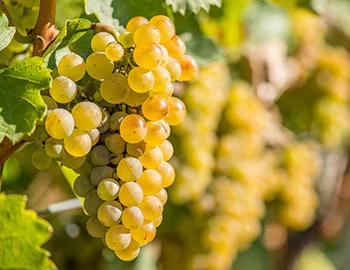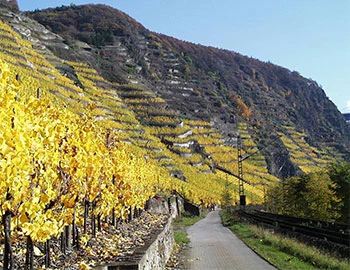Riesling Kreid Weingut Rings 2019
QbA Pfalz, Weingut Rings, 750 ml

Description
In 2018, the Rings brothers pressed the Riesling Kreid for the first time, which is intended as a homage to their father. It comes from a prime piece of the Saumagen, the old "Kreidkeller" vineyard. The vines, which are over 30 years old, stand on white limestone with ferruginous red earth in the subsoil directly next to the forest with a cool microclimate. Riesling, puristic and bone dry, just as the Rings' father liked it. A big, complex and concentrated wine that still needs some time or wants to be caraffed: strong structure, tight palate, delicate creaminess (ageing on the full lees), a little smoky, some white peach and yellow stone fruit, white pepper and blackcurrants, herbal-citric- mineral, cool, maritime character. You can literally feel the terroir on the tongue. Smallest production, very limited availability. Robert Parker / The Wine Advocate / Stephan Reinhardt write about it: "Tasted as a sample in April 2020, the 2019 Riesling Trocken Kreid (from the iron-rich Kreidkeller plot of the Kallstadter Saumagen) is very fine and complex on the perfectly ripe and elegant nose. On the palate, this is a round, mouth-filling, silky-textured yet nervous, chalky and highly finessed dry Riesling with great intensity, balance and remarkable distinction. The finish is crystalline, incredibly refined and salty, full of tension and weightlessness. This is a spectacular and promising wine. Made only for the second time after the 2018 firstling."
Attributes
| Origin: | Germany / Pfalz |
| Grape variety: | Riesling |
| Label: | Vegan, Certified organic or biodynamic wine |
| Ripening potential: | 2 to 10 years |
| Drinking temperature: | 10 to 12 °C |
| Food Pairing: | Apéro pastries, Fish terrine, Asparagus specialities, Giant crevettes, grilled langoustines, Mild Asian dishes |
| Vinification: | soft pressing, fermentation in steel tank, fermentation at low temperatures |
| Harvest: | hand-picking with simultaneous grape sel, in several rounds (tries) |
| Maturation: | partly in steel tank |
| Volume: | 12.5 % |
| Note: | Contains sulphites |
Riesling
The cold-weather king
The Riesling is the flagship of the German wine industry. It grows from north to south in all growing areas. It is also comfortable in the neighbouring Alsace region and in Austria. Its specialty is being vinified to a variety of degrees of sweetness, from bone-dry wines to ice wine. Moreover, thanks to its spirited acidity, it ages better than many reds. The typical Riesling smells of citrus, peach and apricot, shows hints of flint, and with maturity develops an idiosyncratic petrol note. It reflects its terroir like hardly any other white variety. Thus, it often gets fuller and more aromatic in Austria than in Germany. In Alsace, in turn, it has a particular mineral taste. Riesling is a wonderful culinary companion. It fits well not only with fish and shellfish, but also takes the heaviness from hearty meals. And with a fine sweetness and acidity balance, it works wonders for Asian cuisine.

Pfalz
Pfalz: Riesling meets Burgundy
Palatine winemakers manage the feat of vinifying top-tier crus from both white and red varieties. In addition, Riesling presents the same class here as Chardonnay and other Burgundy varieties. This versatility at high quality levels makes Germany’s second-largest wine region a trove of discoveries of all kinds. Tranquil winegrowing towns with a diverse range of culinary offerings and hotels make the Palatinate region a perfect wine travel destination.

Germany
Germany – Into the elite the hard way
Sitting in the heart of Europe, the hilly, lake-dotted landscape of Germany provides ideal, fertile soil for the most diverse vine varieties. From Albalonga to Zweigelt, over 140 different grape varieties are grown on about 100,000 acres, cared for by nearly 50,000 vintners. Most of these vintners are young, modern, internationally trained, inquisitive and urbane. It is hardly surprising, then, that German wine has a good reputation well beyond the country's borders.



